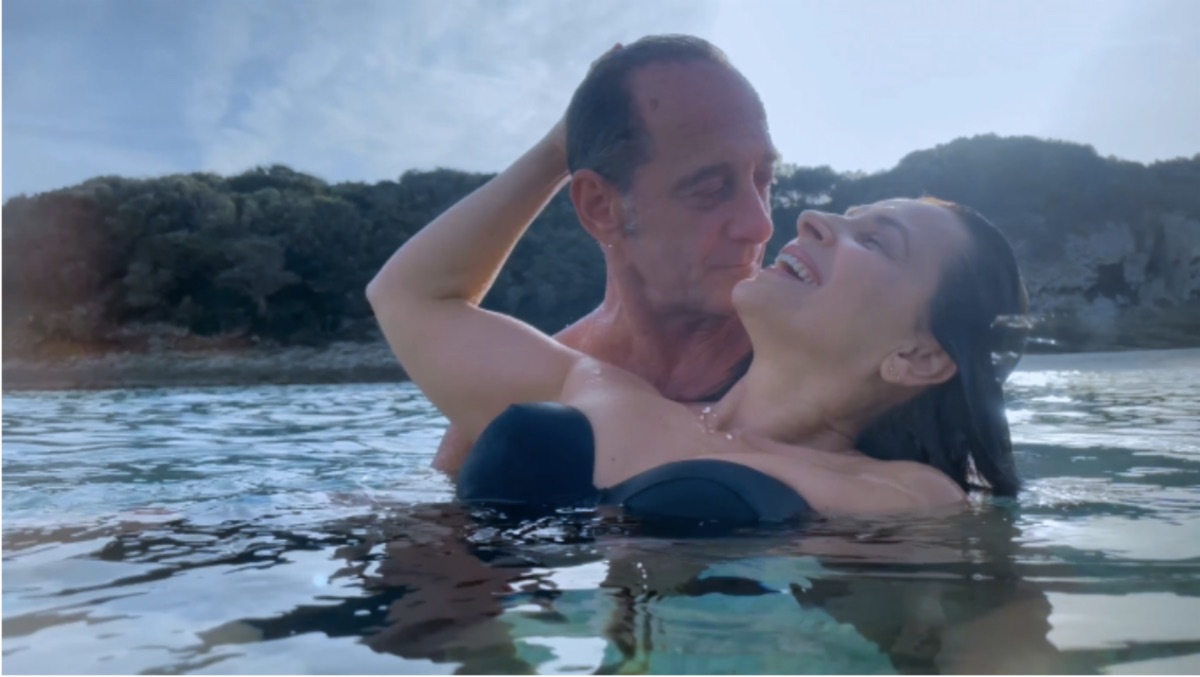Claire Denis and Juliette Binoche, who have now made three films together, are a match made in a gloriously idiosyncratic heaven. Denis is one of our finest, most fascinating living filmmakers, and Binoche is one of our most rapturous and expressive actors—she’s become more luminous, and more compelling, as she ages. In their 2017 collaboration Let the Sunshine In, Binoche played a divorced Parisian painter looking for new love; in 2019’s High Life, she played an inscrutable scientist in charge of a fertility experiment in deep space. The two films couldn’t be more different, but in both, Binoche plays characters in their fifties who aren’t even close to giving up on sex. If anything, the women she plays are only just getting going.
The same is true in Denis and Binoche’s third film, Both Sides of the Blade (The film won the director’s prize at this year’s Berlin Film Festival). Its linchpin is a simple love triangle—not that any love triangle is ever simple. Binoche plays Sara, a radio host who lives in Paris with her partner, Jean (Vincent Lindon), a man whose past hasn’t fully allowed him to settle into the present. Jean has done time in prison and is having trouble finding gainful employment, and there are problems with his teenage son, who lives with Jean’s mother (played by veteran French actress Bulle Ogier) in a town outside Paris. Sara is essentially supporting Jean, though she doesn’t seem to mind. Then a job offer appears: Jean, a former rugby player, gets a call from his best friend, asking him to join a new sports agency as a scout. The catch is that the friend is also Sara’s ex, François (Grégoire Colin). And he’s the kind of ex who, when spotted from afar on the street, stops Sara’s heartbeat cold.
Read more reviews by Stephanie Zacharek
This doesn’t necessarily mean Sara will backslide. Or does it? The layers of complexity and mystery built into a Claire Denis film mean that you can never assume where it’s headed. (The script was cowritten by Denis and Christine Angot, who also collaborated on Let the Sunshine In.) Denis opens Both Sides of the Blade with a seaside idyll, gorgeously shot by ace cinematographer Eric Gautier: Sara floats in Jean’s arms, the sun dappling their skin and the water with its light, knowing that both deserve its blessing. They kiss. There’s no one else in their world, no one who could possibly intrude on it, at least for that moment. Elsewhere in the film we see them in bed, entwined, lost in enjoyment of each other. It’s Sara’s pleasure that Denis focuses on, so feral and whole that you can’t imagine she’d want anything more. To put it another way: her sex life is off the charts.

Both Sara and Jean are so real to us, so carnal in their very being, that François—more of a ghost figure, a dream rather than a real human being—hardly seems a threat. But that doesn’t diminish the danger he poses to the pattern of Sara’s life. And here, pattern isn’t a synonym for boredom. Denis clearly establishes the bond between Sara and Jean, and the actors make it whole. Lindon—who seems to carry the weight of the world in the bags beneath his eyes, among the sexiest eye-pooches ever seen on-screen—plays Jean as a man who knows how lucky he is, how rare it is to find the bliss he shares with Sara.
Yet there’s the catch: Jean is happy to be settled, as if settled were a nice, comfortable spot on a timeline. But Sara is too restless in her very being to even have a timeline. At one point she tells Jean, “When you love someone, it never really goes away.” Those could be read either as words of warm, lived-in wisdom or a hurtful truth, but as Binoche plays Sara, they’re both. As a performer, Binoche, with her melting brown eyes and subtly secretive smile, is innately sympathetic: you want to be on her side no matter what. That’s as true in Both Sides of the Blade as it is anywhere else, but she and Denis are wily co-conspirators. Sara resists control, within the context of the story but also when it comes to our feelings about her. Her behavior may be morally indefensible, but it’s impossible to judge her. You might wave it away by saying, “Men do stuff like this all the time and get away with it,” but that’s not the point. In Both Sides of the Blade, Sara isn’t acting like a man; she’s simply being herself, and the raw texture of her desire, and how it affects her behavior, isn’t something we can either applaud or disapprove of. It’s just there, in all its cruel, ragged splendor. How often do we see that in a movie character who happens to be a woman? Not as often as we should, and it’s harder to witness and parse than you might imagine. It’s also pretty great.
More Must-Reads From TIME
- The 100 Most Influential People of 2024
- The Revolution of Yulia Navalnaya
- 6 Compliments That Land Every Time
- What's the Deal With the Bitcoin Halving?
- If You're Dating Right Now , You're Brave: Column
- The AI That Could Heal a Divided Internet
- Fallout Is a Brilliant Model for the Future of Video Game Adaptations
- Want Weekly Recs on What to Watch, Read, and More? Sign Up for Worth Your Time
Contact us at letters@time.com